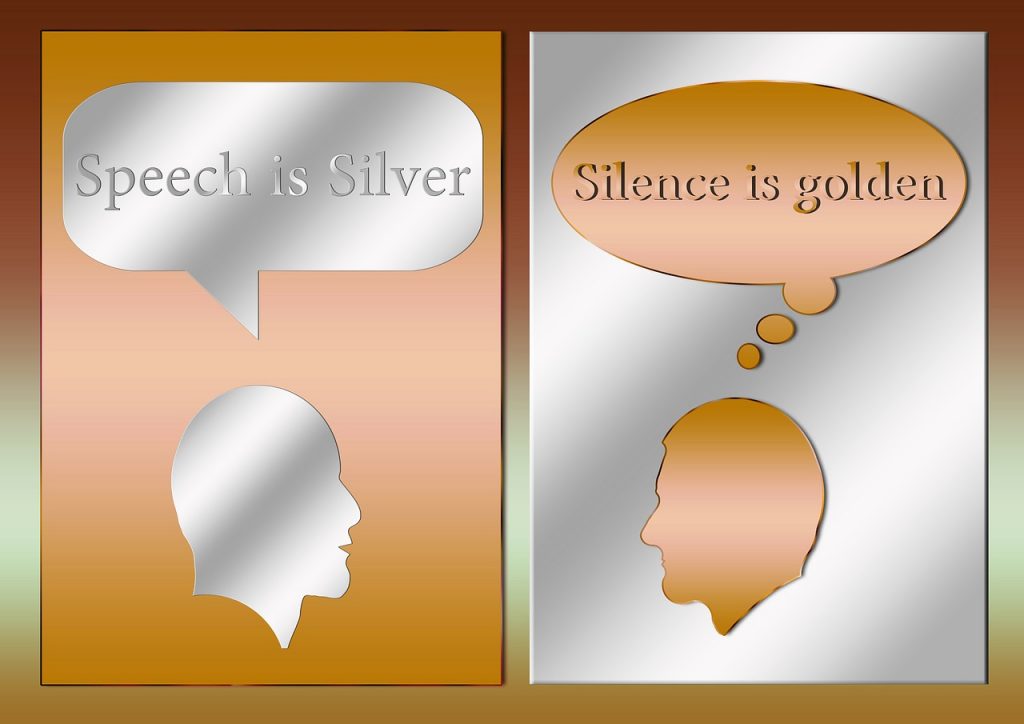I always thought it would be cool to be “a man of few words.” You, know, the tall, dark, strong, silent type idealized in movies. I’d be someone who seldom spoke, but when I did dispense a nugget of wisdom or astute observation, heads would turn. My words would be weighty and profound. Reporters would write them down. We’re talking viral tweets. Alas, I am not a man of few words. My son Josh is, though, so I guess that counts for something–being “the father of a man of few words.” Maybe I’ll start introducing myself that way.
 After telling us to be quick to listen, the Bible instructs us to be slow to speak. Now I was raised in the south, where speaking slowly is an art form, ya’ll. But this is more about giving careful consideration before we speak, or, as I once heard it, not “saying things we haven’t thought of yet.” How might this serve us and others well?
After telling us to be quick to listen, the Bible instructs us to be slow to speak. Now I was raised in the south, where speaking slowly is an art form, ya’ll. But this is more about giving careful consideration before we speak, or, as I once heard it, not “saying things we haven’t thought of yet.” How might this serve us and others well?
Being slow to speak offers more opportunity to listen. Listening to the right things, we learn and grow wiser. In fact, one could tie self-control in our speech to a host of other virtues. We’re also far less likely to offend people unnecessarily. And if we’re not frequently spouting things best left unsaid, people are more likely to listen to the worthwhile thoughts we might occasionally express.
 One time I challenged a Bible study group I led to read through the book of Proverbs in a month and mark every verse that in any way related to speech. Here’s one worth remembering the next time you can’t wait to share your unsolicited opinion: A fool does not delight in understanding, but only in revealing his own mind (Proverbs 18:2). Or Do you see a man who is hasty in his words? There is more hope for a fool than for him (Proverbs 29:20). How about Proverbs 10:19, When there are many words, transgression is unavoidable, but he who restrains his lips is wise. There are many others—chief of which is Proverbs 18:21, declaring death and life are in the power of the tongue. The Bible encourages us to speak words that bring life, springing from our new creation nature (2 Corinthians 5:17, Ephesians 4:29).
One time I challenged a Bible study group I led to read through the book of Proverbs in a month and mark every verse that in any way related to speech. Here’s one worth remembering the next time you can’t wait to share your unsolicited opinion: A fool does not delight in understanding, but only in revealing his own mind (Proverbs 18:2). Or Do you see a man who is hasty in his words? There is more hope for a fool than for him (Proverbs 29:20). How about Proverbs 10:19, When there are many words, transgression is unavoidable, but he who restrains his lips is wise. There are many others—chief of which is Proverbs 18:21, declaring death and life are in the power of the tongue. The Bible encourages us to speak words that bring life, springing from our new creation nature (2 Corinthians 5:17, Ephesians 4:29).
 Speaking less gives us the chance to demonstrate humility. As we pay more attention to our words, we’re also more apt to model love, kindness, and gentleness and to offend others less frequently. Another fruit of the Spirit is self-control, and James makes this incredible statement: If anyone does not stumble in what he says, he is a perfect man, able to bridle the whole body as well (James 3:2). What if taming your tongue were the gateway to self-discipline as a whole? What else in your life might change for the better?
Speaking less gives us the chance to demonstrate humility. As we pay more attention to our words, we’re also more apt to model love, kindness, and gentleness and to offend others less frequently. Another fruit of the Spirit is self-control, and James makes this incredible statement: If anyone does not stumble in what he says, he is a perfect man, able to bridle the whole body as well (James 3:2). What if taming your tongue were the gateway to self-discipline as a whole? What else in your life might change for the better?
A favorite proverb of mine extols the virtue of being “slow to speak” and promises to make us look smarter than we actually are!
Even a fool, when he keeps silent, is considered wise; When he closes his lips, he is considered prudent (Proverbs 17:28).
That says it all. OK, I’m done.

